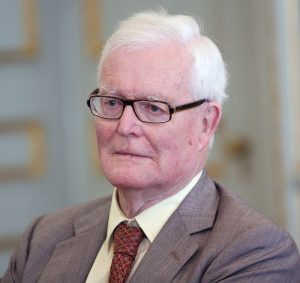Douglas Hurd – 1985 Speech on Immigration
Below is the text of the speech made by Douglas Hurd, the then Home Secretary, in the House of Commons on 29 October 1985.
Following the recent exchanges in the House, I will, with your permission, Mr. Speaker, make a statement about representations made by right hon. and hon. Members in immigration cases.
Ministers receive large numbers of representations from Members of this House on a wide variety of individual cases. What distinguishes those made on behalf of passengers refused entry at the ports is that they have the effect of securing an immediate change in the action that would otherwise be taken by the immigration service under the relevant statutory provisions. The service is by convention, though not by law, precluded from arranging the passenger’s removal until the hon. Member’s representations have been received and considered. In the vast majority of cases, the passenger is granted temporary admission. In a small minority of cases, he may be held in detention at the port.
Home Office Ministers received representations on immigration cases about 20 times a week in 1980. Last year, the average was some 70 a week. During the past few weeks there have been 200 representations a week. The increase since 1980 is not the result of some dramatic change in the criteria being employed by immigration officers at the ports in operating the immigration rules. Nor can it be explained by an increase in passenger traffic, which has increased by 25 per cent. while hon. Members representations have increased fivefold taking the year as a whole. What is happening is that hon. Members are being approached and asked to put stops on cases more often than in the past, and hon. Members are agreeing to ask for stops on cases more often than in the past.
That increase has created real administrative problems for the staff at the ports. People are being temporarily admitted who do not qualify as visitors under the rules, and who often spend a considerable time here. The diversion of staff to deal with increasing representations and the case work involved has meant that visitors who are fully qualified find themselves held up and inconvenienced at Heathrow.
Against that background, I believe that it was entirely right for my hon. and learned Friend the Minister of State to bring the position to the notice of the House. I wish to make it clear that my hon. and learned Friend was not at any time sugesting that the law had been broken. In his letter yesterday to the right hon. Member for Manchester, Gorton (Mr. Kaufman), he described the ways in which the present arrangements are being misused.
It was argued yesterday that my hon. and learned Friend should have given specific examples to the House of the action taken by particular hon. Members. As he explained, he could not have done that without revealing the terms of the letters that they had written to or about individual immigrants and, in two cases, letters written by them to third parties. He is writing today to 23 hon. Members, whose cases are examples of the various problems that we are facing, seeking their permission to make such correspondence public.
There are obvious difficulties, for example when hon. Members make representations on behalf of sponsors of whom they have made no inquiries, and when they arrange for a stop to be placed on a passenger’s removal but fail to follow up the initial telephone call with a confirmatory letter. There is also concern that some hon. Members are willing to take up cases from outside their constituencies, which the constituency Member has chosen not to pursue. Here again, some restatement of the agreed conventions of the House is needed.
Finally, there are one or two cases in which it seems to us that an hon. Member is deliberately facilitating the attempt to secure the temporary admission of a passenger whom he has every reason to believe would not qualify for entry under the rules approved by this House. I am not suggesting that, even where that happens, hon. Members have acted unlawfully; they have not. But if their actions were to be more widely copied, the result could only be the weakening of our system of immigration control, based at the ports of entry. I believe that our present system suits both our geography and our constitution and that we need collectively to consider how it can best continue to operate.
I ask the House to accept that we wish to make a genuine attempt to strike the right balance between the representations of hon. Members and the need for an effective and efficient control without the strains at present imposed on it. We are anxious to discuss these difficulties urgently with those in this House who are mainly concerned, in the hope of working out a sensible answer. In any case, there will not be any changes in our procedures before I have reported to the House.

